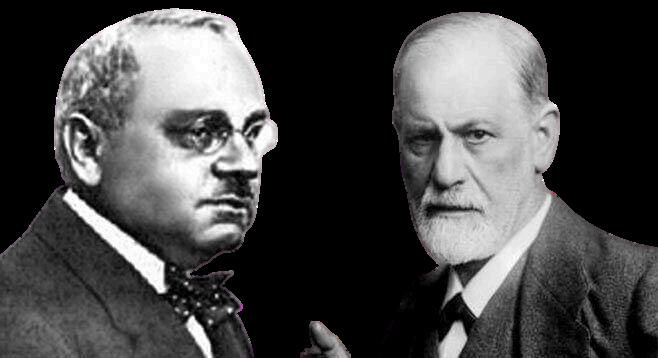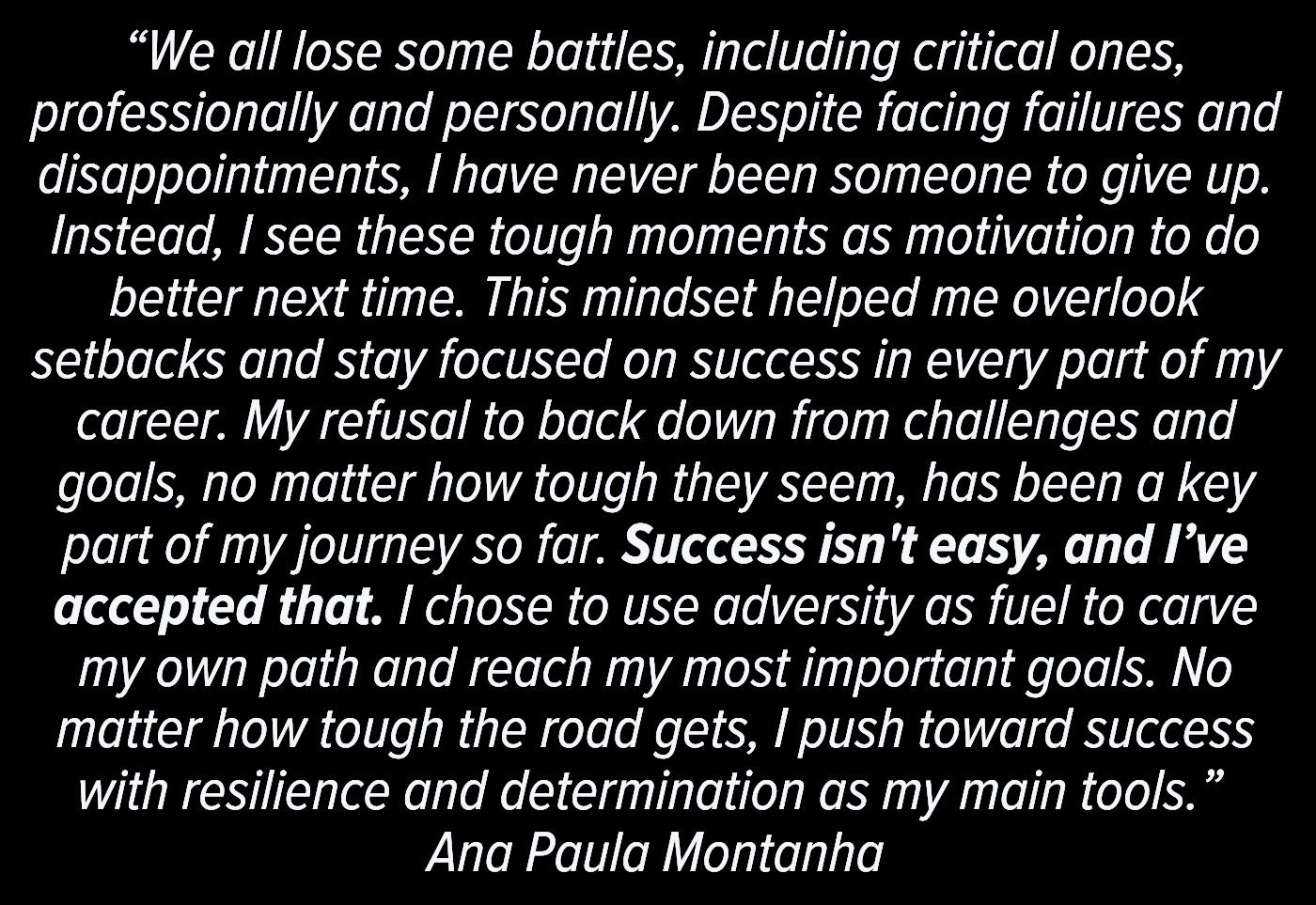THE NEW RULES OF LEADERSHIP
Ana Paula Montanha, Editor-in-Chief, Human Capital Career Trends Magazine & globally recognized Chief Human Resources Officer.
In today’s highly competitive market, visible successes often distract us from what truly sets apart long-lasting careers: the quiet ability to stay strategic when others become reactive, to stay focused when noise intensifies, and to keep advancing even after setbacks temporarily disrupt momentum. The professionals who reach the top, especially those capable of leading internationally, do not always win every battle. What differs them is that they plan their actions to win the overall war.
Modern success belongs less to the naturally gifted and more to those who engineer their outcomes. These leaders design their careers with a general’s mindset: they understand that short-term losses, disappointments, and market fluctuations are components of the battlefield, not verdicts. The war is won by staying committed to a larger plan.
The Myth of Constant Victory
Behind every celebrated career lies a series of failures: promotions that never arrived, opportunities that disappeared, bold moves that backfired, projects that were discarded. There is a profound misconception that executive success is the result of linear progress, when in fact, it is built on cycles of risk, recalculation, and relentless resilience. The most powerful leaders share one essential quality: they do not allow defeat to redirect their focus from the mission. They regroup, rethink, and march forward.
When we evaluate professionals relocating to new countries, especially to challenging landscapes like the United States, we notice a similar pattern. Those who thrive are not necessarily the most talented, but rather those who arrive with structured intent. They do not rely on emotion or hope, but on information, planning, and measurable execution.
Turning Setbacks into Strategic Intelligence
is impossible to reach a new level of adership if we panic in the face of esistance. Every goal worth pursuing equires paying a psychological cost: ourage, public exposure, ego bruising, and ometimes loss. The modern executive ccepts this. They use data from every bstacle: What did this experience reveal bout my preparation? What system must I mprove? What capability do I need next?
hinking this way, their setbacks become telligence, and success becomes redictable.
our career deserves the same level of rategic planning as any major ternational expansion would require, ncompassing research, deadlines, esource allocation, risk management, artnerships, and scenario planning. It emands a clear timeline, not mere good tentions. A framework, not mprovisation. Often, the difference etween careers that stagnate at midmanagement and those that eventually perate at the boardroom level is not skill, ut strategy.
“
Success in business isn’t just about strategy; it’s about consistency, innovation, and relentless perseverance.
Five Pillars of Elite Career Strategy (2025 Forward)
1
Define measurable milestones aligned to a long-term vision.
Big dreams without structure lead to chronic frustration. Strategic professionals convert vision into monthly, quarterly, and annual checkpoints They clarify what “progress” means, then track it obsessively
4
1 The “future of work” is no longer futuristic; it is here Track technological, demographic, political, and labor-market movements. Those who anticipate, rather than react, become invaluable. Stay ahead of the market and industry evolution
2
Invest in yourself with discipline.
Education, skill expansion, executive presence, crosscultural fluency, and emotional self-management are assets Professionals who dominate the next decade will be those who out-learn, out-adapt, and out-position the competition
Operate with intentional networking. 3
Elite careers are propelled by key individuals: mentors, sponsors, strategic peers, and reputational champions Cultivate them Your network is part of your engine, especially when expanding across markets.
5
Internalize resilience as a leadership requirement, not a personality trait
Failure is not optional Rejection will come Obstacles will arise. Executives who survive and excel are those who expect resistance, and move anyway.
Alfred
Adler:
A Psychological Lens: Alfred Adler & the Quiet Courage Required to Lead
While strategy is the intellectual structure of a successful career, emotional maturity is its engine. No thinker better captured this than Alfred Adler, the Austrian psychiatrist who broke away from Freud and founded Individual Psychology. His work has resurfaced among modern executives in large part due to the global bestseller The Courage to Be Disliked, a book now widely praised in leadership circles
Adler argued that true power lies not in declaring oneself superior, but in forging a bold purpose and operating independently of others’ approval. He believed what truly shapes us is not our past, but the future we commit to building.
A Quiet Revolution in Leadership Psychology
Alfred Adler (1870–1937) was an Austrian physician and pioneering psychologist who broke away from Freud to establish Individual Psychology Unlike the deterministic schools of thought of his era, Adler argued that human beings are not defined by their past but propelled by the goals and purposes they set for their future. He introduced core concepts still highly relevant for today’s executives the universal sense of inferiority that fuels growth, the principle of separating what is our task from what belongs to others, and the courage to pursue authenticity even at the risk of disapproval His insights on resilience, purpose, and agency remain a cornerstone for leaders who must navigate complexity while staying centered on long-term strategy
His principal ideas are surprisingly potent for career leadership:
Inferiority is inevitable and necessary. We all start from a place of insufficiency That discomfort can either paralyze us (inferiority complex) or propel us to grow (desire to overcome). Elite leaders choose growth. Separate your tasks from others’ tasks. Do not waste energy trying to control people or perceptions. Focus on your preparation, decisions, and execution — not on winning universal approval. Your task is strategy. Other people’s opinions are theirs.
Have the courage to be disliked. Bold executives make decisive moves that may be misunderstood. Adler believed that seeking constant validation is a trap that keeps individuals hostage to fear Emotional freedom and career expansion require acting on one’s values regardless of applause
These ideas are essential when pursuing cross-border careers. Relocating, changing markets, switching industries, or applying for a U.S. executive immigration visa all demand the courage to be misinterpreted, the willingness to accept destabilizing transitions, and a deep connection to one’s purpose.
Simply put, the leaders who expand globally are not those with perfect circumstances, but those with the emotional strength to execute even when public understanding is delayed.
WINNINGTHEWAR
The modern leader’s war is not fought on a field, it is fought across markets, boardrooms, visa systems, interviews, technological revolutions, and personal doubts. You will lose some battles along the way. You may be rejected ten times before one door opens. You may sacrifice comfort and social approval. That is not failure; that is the terrain.
Winning the war requires:
1.Vision strong enough to survive temporary defeat
2.Structure capable of turning time into progress
3.Psychological maturity to move without applause
Each day you invest in your strategy, growth, and resilience, you pull further ahead of the pack, not through spectacle, but through consistency.
As Thomas Jefferson wisely observed, “The harder I work, the luckier I get. ”
And as Kevin Durant famously said, “Hard work beats talent when talent fails to work hard.”
The world does not reward talent alone. It responds to strategy in motion.
Your success will not be determined by whether you experience defeat. You will. It will be determined by whether you possess the courage, clarity, and resilience to keep advancing, not once, but possibly a thousand times. That is how elite careers are built, whether in São Paulo, Miami, New York, Dubai, or anywhere bold, strategic professionals choose to go.
Lose the battles if you must. But build your career to win the war.











